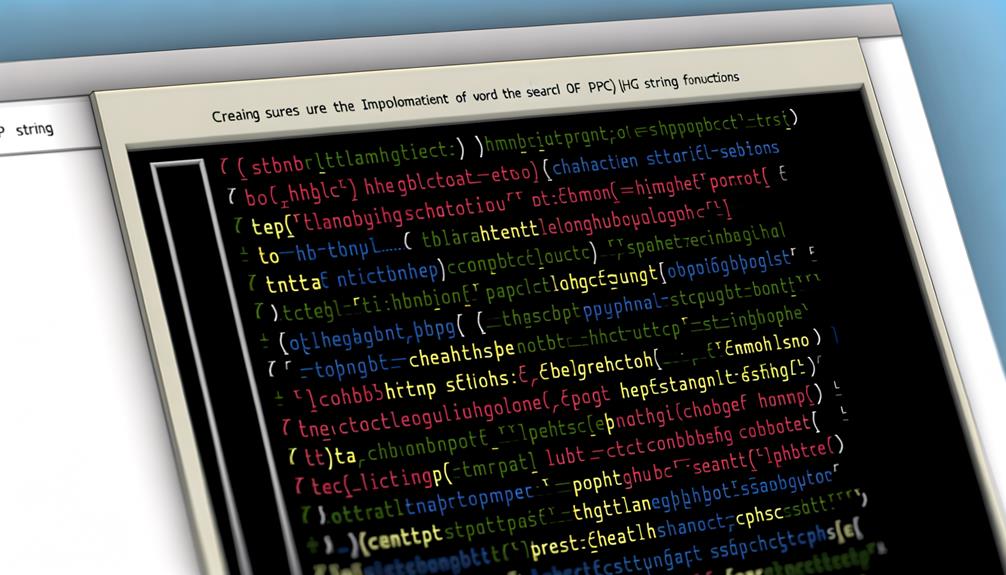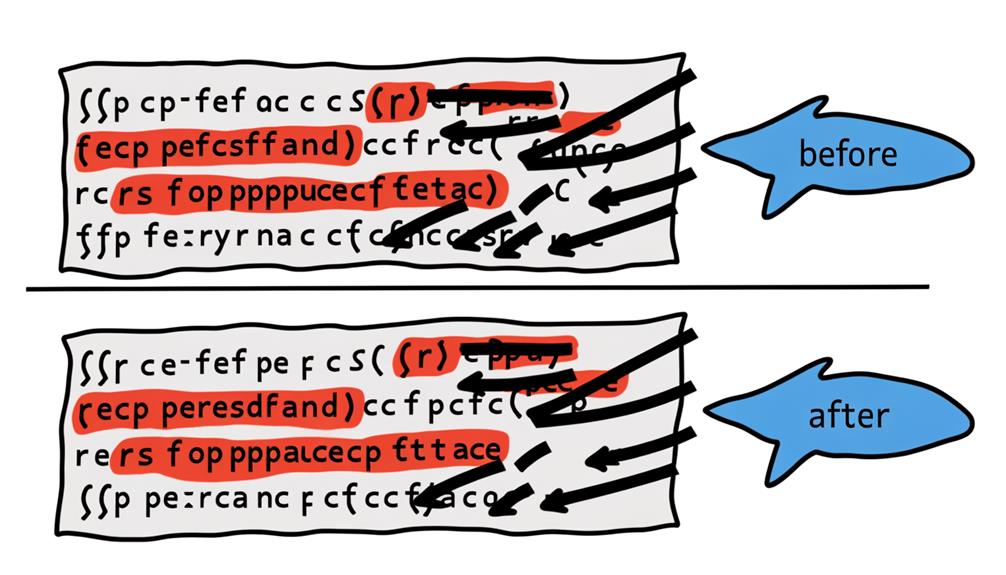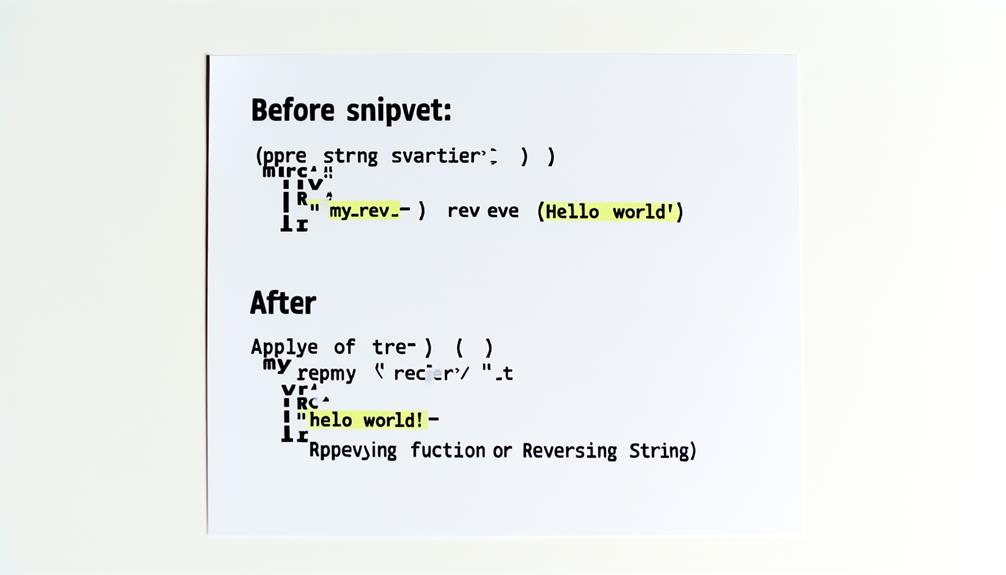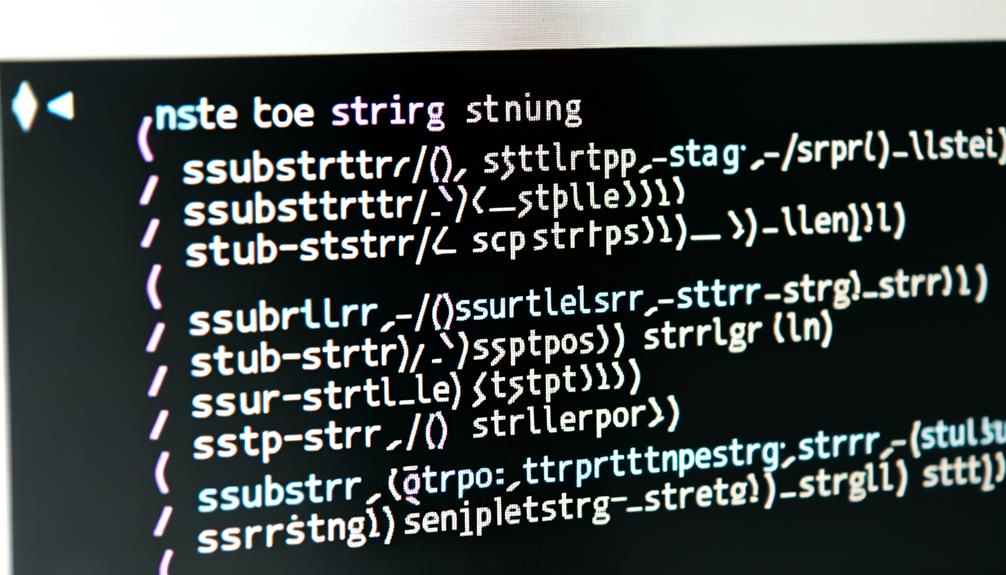As developers, we often find ourselves navigating through the intricate web of PHP string functions, akin to skilled artisans meticulously crafting a masterpiece. These functions are the threads that weave together the fabric of our code, allowing us to seamlessly manipulate and extract meaning from strings.
From unraveling the position of substrings to metamorphosing the case of characters, PHP's arsenal of 80 string functions holds the key to unlocking a multitude of possibilities.
As we embark on this journey through the labyrinth of PHP string functions, we will uncover the secrets behind these powerful tools, unraveling their potential to streamline our coding endeavors and elevate the functionality of our projects.
Position Functions

Position functions in PHP are essential for locating the position of a substring within a string, enabling efficient manipulation and extraction of specific parts of the text. These functions empower us to liberate our code from the constraints of manual searching and manipulation, allowing for a more dynamic and responsive approach to text processing.
With strpos() and its case-insensitive counterpart stripos(), we can confidently pinpoint the exact location of a substring, unleashing the potential for targeted transformations.
Additionally, strrpos() and strripos() offer the ability to navigate to the last occurrence of a substring, providing a comprehensive understanding of the string's structure.
Substring Functions
Embarking on the exploration of substring functions, we uncover the dynamic capabilities that allow us to extract and manipulate specific segments of text with precision and finesse.
The 'substr()' function empowers us to extract a substring from a string, while 'mb_substr()' ensures multibyte-safe extraction.
Additionally, 'substr_replace()' enables us to replace a part of a string with another string, offering a powerful tool for manipulation.
With 'strtr()', we can replace characters in a string based on a translation table, further enhancing our ability to tailor text to our needs.
Lastly, 'mb_strcut()' allows us to trim a string to a specified length, giving us the freedom to control the presentation of our text.
These functions liberate us to wield text with mastery and creativity.
Replace Functions

Unleashing a new realm of possibilities, the focus now shifts to the vibrant domain of Replace Functions, where we harness the power to transform and manipulate text with finesse and ingenuity. These functions empower us to seamlessly swap substrings, execute complex pattern-based replacements, and perform case-insensitive substitutions. Let's explore how these dynamic tools can elevate our coding prowess:
| Function | Description | Example |
|---|---|---|
| str_replace() | Replace all occurrences of a substring | `str_replace('old', 'new', $string)` |
| preg_replace() | Perform a regex search and replace | `preg_replace('/\d/', 'X', $string)` |
| str_ireplace() | Case-insensitive version of str_replace | `str_ireplace('search', 'replace', $string)` |
| substr_replace() | Replace a part of a string with another | `substr_replace($string, 'new', 2, 4)` |
With these tools at our disposal, we can unleash the full potential of our text manipulation endeavors, creating liberation in our coding journey.
Transformation Functions
Let's delve into the transformative realm of string manipulation with the awe-inspiring array of Transformation Functions, where we wield the power to elevate text with finesse and precision. These functions are like the master artists of the string world, allowing us to mold and shape text to our exact desires.
Here are five captivating Transformation Functions that will revolutionize the way you interact with strings:
- ucfirst(): Elevate the first character of a string to uppercase with a touch of sophistication.
- ucwords(): Watch as each word in a string is gracefully transformed to start with an uppercase letter.
- lcfirst(): Embrace the elegance of converting the first character of a string to lowercase.
- strtoupper(): Experience the grandeur of transforming an entire string into a majestic parade of uppercase characters.
- strtolower(): Revel in the liberation of converting a string to all lowercase, setting your text free in a sea of lowercase tranquility.
Miscellaneous Functions

We frequently discover hidden treasures within the realm of string manipulation through the captivating array of Miscellaneous Functions, each offering a unique and invaluable tool for enhancing our text with finesse and precision. To further enlighten ourselves, let's explore some of these functions in a structured manner through the following table:
| Function | Description |
|---|---|
| money_format() | Formats a number as a currency string. |
| count_chars() | Returns information about characters in a string. |
| str_getcsv() | Parses a CSV string into an array. |
| quotemeta() | Quotes meta characters in a string. |
These functions not only add versatility to our string manipulation repertoire but also empower us to unlock new levels of creativity and efficiency. Embrace the freedom these tools provide as we continue our journey of mastering the art of string manipulation.
Frequently Asked Questions
Can PHP String Functions Be Used to Manipulate and Format Date and Time Strings?
Yes, PHP string functions can manipulate and format date and time strings.
Functions like str_replace() and preg_replace() can be used to replace specific elements in date and time strings.
Additionally, functions like ucfirst() and strtoupper() can be employed to capitalize or convert strings to uppercase, which can aid in formatting date and time strings.
These functions provide flexibility and control when working with date and time data.
How Can PHP String Functions Be Used to Handle and Manipulate Multibyte Characters and Strings?
We can handle and manipulate multibyte characters and strings using PHP string functions. These functions, such as mb_substr() and mb_strcut(), are specially designed to work with multibyte characters, ensuring accurate string manipulation.
Additionally, functions like mb_strtoupper() and mb_strtolower() help us transform strings to uppercase or lowercase, respecting multibyte characters.
With these tools, we've the power to efficiently manage and process multibyte character strings in PHP.
Are There Any Built-In PHP String Functions for Handling and Manipulating HTML or XML Strings?
Yes, there are built-in PHP string functions for handling and manipulating HTML or XML strings.
Functions like htmlspecialchars() and htmlentities() help to escape special characters in HTML or XML strings, ensuring data security.
Additionally, functions such as strip_tags() and xmlspecialchars() aid in removing or encoding HTML or XML tags from strings.
These functions provide powerful tools for effectively managing HTML or XML content within PHP applications.
Can PHP String Functions Be Used to Handle and Manipulate Binary Data or Files?
Yes, PHP string functions can be used to handle and manipulate binary data or files.
We can utilize functions like substr() to extract specific parts of binary data, str_replace() to replace certain sequences, and count_chars() to gather information about the characters used.
Additionally, we can parse CSV strings into arrays using str_getcsv(). These functions offer flexibility and power in working with binary data and files within PHP.
How Can PHP String Functions Be Used to Handle and Manipulate Strings in Different Character Encodings, Such as UTF-8 or Utf-16?
We handle and manipulate strings in different character encodings, like UTF-8 or UTF-16, using PHP string functions. These functions, such as mb_substr() and mb_strcut(), support multibyte characters, allowing us to work with different encodings.
Additionally, functions like mb_strtolower() and mb_strtoupper() help in converting strings to lowercase or uppercase, considering the specific encoding.
These capabilities liberate us to effectively manage diverse character encodings.
Conclusion
In conclusion, PHP string functions serve as invaluable tools for developers, offering a wide range of capabilities to manipulate and extract information from strings.
From finding positions to transforming cases, these functions empower us to handle diverse string operations efficiently.
By exploring the examples and use cases of these functions, we can harness their power to enhance our coding projects and streamline our development processes.
With PHP string functions at our disposal, the possibilities are endless.







